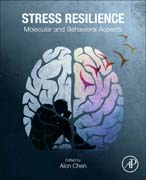
Nearly all of us experience some level of stress on a regular basis and most of us will experience extreme stress or trauma at some point in our lives. Yet how we react to such stress varies greatly, with a small percentage of people developing a stress-related psychopathology such as anxiety or depression. But why do some children who experience abusive treatment develop psychological disorders that persist into adulthood, while others aren't affected? Why are some military service members stricken with debilitating PTSD following combat trauma, when their fellow soldiers see no impact on their daily lives? There is growing interest in what makes some individuals resilient to stress, because being able to pinpoint what makes someone resistant to developing stress-related psychopathologies will be key for preventing such disorders and developing treatments for them. Stress Resilience will be the first reference book available that describes the full breadth of cutting-edge research being carried out in this field. It includes a wide range of basic molecular knowledge of potential associations between resilience phenomenon and biochemical balance, and focuses on the molecular and cellular mechanisms underlying stress resilience. World-renowned experts in the study of stress resilience provide chapters covering everything from neural circuits of resilience to the effects of early-life adversity to the transgenerational inheritance of resilience. This unique and timely book will be a go-to resource for neuroscientists and biological psychiatrists who want to improve their understanding of the consequences of stress and on how some people are able to avoid them. Approaches resilience as a process rather than as a static traitProvides basic molecular knowledge of potential associations between resilience phenomenon and biochemical balanceThorough coverage of both genetic and environmental factors contributing to resilience INDICE: 1. Stress Resilience and Neuronal Plasticity 2. Resilience as a Process Instead of a Trait 3. Cognitive and Behavioral components of Resilience to Stress 4. The brain mineralocorticoid receptor: A resilience factor for psychopathology? 5. GABAB Receptors and Stress Resilience: A Tale of Two Isoforms 6. Sex Differences in Programming of Stress Resilience 7. Active Resilience in Response to Traumatic Stress 8. Rhythmic Regulation of Stress Resilience 9. The Role of Low Anxiety and/or Brain Bioenergetics in Stress Resilience 10. Understanding Resilience: Biological Approaches in At-Risk Populations 11. Stress Resilience as a Consequence of Early-life Adversity 12. Mechanisms by which Early-life Experiences Promote Enduring Stress Resilience or Vulnerability 13. The Role of Child Abuse and Neglect in Stress Responsivity/ Resilience 14. How Genes and Environment Interact to Shape Risk and Resilience to Stress-Related Psychiatric Disorders. 15. Molecular Characterization of the Resilient Brain: Transcriptional and Epigenetic Mechanisms 16. The Role of the CRF-Urocortin System in Stress Resilience 17. Transgenerational Inheritance of Resilience from Preclinical to Clinical 18. Intergenerational Transmission of Stress Vulnerability and Resilience in Humans 19. Neural Circuits of Stress Resilience 20. The Neuro-connectomics of Stress Resilience 21. Stress-linked Psychopathologies 22. Maladaptive learning and the amygdala - prefrontal circuits: from genes to spikes
- ISBN: 978-0-12-813983-7
- Editorial: Academic Press
- Encuadernacion: Rústica
- Páginas: 240
- Fecha Publicación: 01/11/2019
- Nº Volúmenes: 1
- Idioma: Inglés
